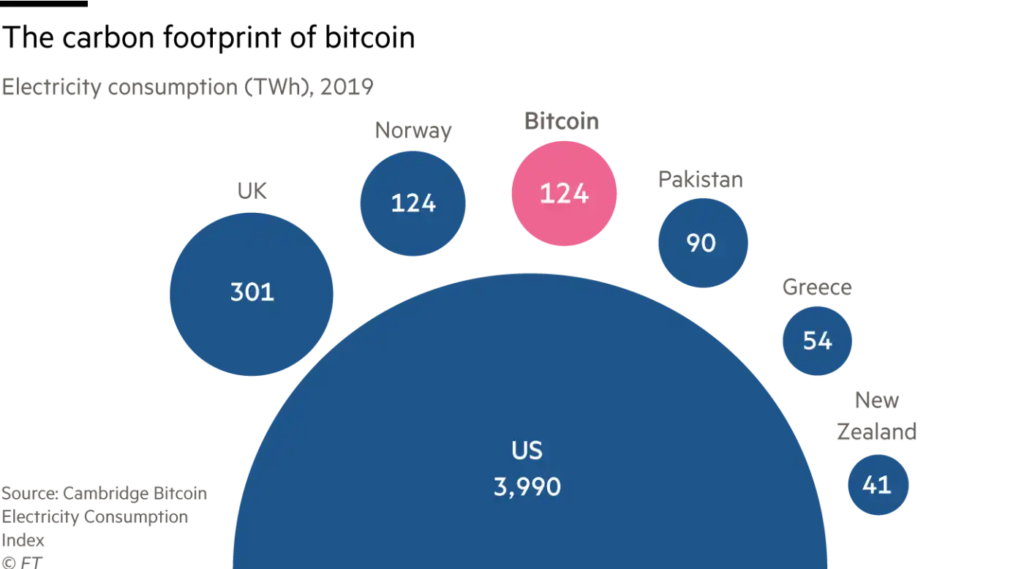
Happy Tuesday. Just remember, if anyone claims not to be a cat this week they probably are.
In today’s edition:




“Pints for PPE”
On average 45 million masks were disposed of per day in the US throughout 2020. Anheuser-Busch (the American beer brewery) has partnered with Terracycle to promote the recycling of personal protective equipment (PPE) through their “Pints for PPE” campaign. Customers visit local brew bars to dispose of PPE, using TerraCycle’s zero-waste boxes, receiving beer in return. The PPE is then repurposed into products like decking and outdoor furniture.
Tesla’s $1.5 Bn purchase of Bitcoin at arms with green credentials
Tesla announced it bought $1.5bn worth of Bitcoin and will start to accept the cryptocurrency as payment for its electric cars, driving prices to all-time highs. The decision has led to some questioning Tesla’s green credentials. If bitcoin were a country its annual electricity consumption would rank 30th in the world. New Bitcoin are introduced into circulation by rewarding ‘Miners’ who use energy intensive computers to solve complex maths problems, to verify transactions (See more). The argument goes that as prices rise more computing power will be spent, increasing carbon emissions.
New territory: No other company has bought as much bitcoin as Tesla. If considered an investment, Bitcoin would make up part of the company’s “indirect” emissions – with potential implications for Tesla’s ESG ratings & position in investors ‘green portfolios’.

Shell claims Oil is past its peak
Shell expects its oil production to decline by between 1% and 2% each year after peaking in 2019. It will rely on oil production to help finance its conversion to renewable energy sources and carbon capture technologies. However, their approach is more conservative than rivals like BP and Total, investing $2 billion to $3 billion a year in renewable energy assets — out of a $22 billion capital investment budget.
🤖 Future of Tech (1-minute read)
The hills are alive with electricity
It’s estimated that the UK will need 13 giga-watts (GW), or over 5,000 wind turbines worth, of renewable energy by 2030 – and the country’s hills could be the answer. RheEnergise’s “high-intensity hydropower” uses a mineral-rich fluid (with 2.5x the density of water) to produce electricity from slopes half as steep to those used in current hydropower. Using a circular system of underground pipes and tanks, high-intensity hydro plants can be set up in more locations, quicker, cheaper and with less environmental impact compared to traditional hydro stations.
An exciting prospect: Renewables overtook fossil fuels as the UKs largest source of electricity in 2020. As demand for, and potential returns from, renewable electricity expand it’s no surprise that RheEnergise want to grow its market share, with plans to build their first high-intensity hydro plant in 2023.

Gillette partners with blockchain-powered recycling firm Plastic Bank
Plastic pledges are aplenty but Gillette’s most recent product launch, Planet KIND, is a little different. The razor, made of 60% recycled plastic, is the result of a partnership with Plastic Bank, a social enterprise that uses digital tokens to incentivise plastic collection in developing nations. Collectors receive money or discounted necessities through an app-based system. On average, collectors earn 63% above the poverty line and many have bank accounts for the first time.‘Social Plastic’ is collected, recycled and sold to international companies, using blockchain to provide a traceable supply chain.
The best a planet can get: Shoppers are expected to spend $150 billion on sustainable products by 2021, and this partnership is a key differentiator for Gillette by providing assurance over it’s sustainable plastic claims.

A digital revolution to boost female workforce equality
The Problem: A McKinsey study shows the Middle East and North Africa (MENA) has the lowest female labor force participation in the world at 24.6%, with barriers preventing women’s access to jobs costing the region $575 billion annually.
The Opportunity: Digitization and data is expected to double job opportunities for women in the MENA to 11 million by 2030. Yet, to ensure women can take advantage of the digital and data revolution, agencies across the region have launched programmes to boost female digital inclusion:
- She Trades MENA: Provides online hubs to support and economically empower women entrepreneurs by connecting them to policymakers and businesses
- Girls got IT: Creating opportunities for girls aged 13-17 to learn about robotics, 3D printing, and software development directly from successful entrepreneurs
- Google + Injaz: Google will provide a million-dollar grant to support students (especially rural and underprivileged women) to learn hands-on digital skills.
The Challenge: Female digital parity across the MENA is far from established. The gender gap in mobile internet usage is 20%, compared to 4% across Europe and Central and Eastern Asia. The success of programmes aiming to boost female digital inclusion will be crucial to long-term female labor force participation in the region.

Little Bytes
Quote: “There is a global imbalance of consumption and resources. With respect to understanding how our inventions interact with nature, humanity…is in its infancy.” Doug Britton, RunSafe
Stat: ‘Cost of biodiversity action will double if delayed until 2030’ Natural History Museum
Watch:How ‘fluffy’ is fixing offshore oil rigs
🗞 In other news…
- Ikea foundation bets $250m on green investment fund
- Aleph unveils a ribeye steak created through 3D bioprinting
- Farmers Edge who Use AI to boost crop yields seeks to go public for $79 million dollars
- Indian government purchases 350 electric buses
- 400 years after being wiped out wild cranes return to Britain




